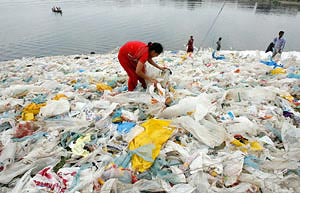Battle of the bags redux
November 12, 2010
 The Board of Supervisors on Tuesday is poised to enact one of the most far-reaching measures in the state to end the environmentally damaging proliferation of single-use plastic bags.
The Board of Supervisors on Tuesday is poised to enact one of the most far-reaching measures in the state to end the environmentally damaging proliferation of single-use plastic bags.
The highly-charged issue is being tackled by the board following the controversial rejection by the state legislature last summer of a ban on plastic bags. That vote came amid a furious multi-million dollar lobbying effort led by the American Chemistry Council, which represents industry players opposed to the measure.
The council has now turned its sights on L.A. County, sending out mass e-mails and using its Stop the Bag Police website to accuse the board of potentially undermining the economy and putting people out of work.
Environmentalists argue that the bags endanger wildlife, foul the beaches and ocean, and cost taxpayers millions annually to clean up. What’s more, they’re virtually indestructible, meaning the sacks can survive in the solid-waste stream for hundreds of years. Among the environmental groups that have written in support of the county’s efforts to ban the bags is Heal the Bay.
In January 2008, the board, led by Supervisor Zev Yaroslavsky, directed county departments to undertake an environmental analysis and develop draft legislation to ban the bags if a voluntary program failed to substantially reduce plastic sack consumption and promote more eco-friendly alternatives.
With the failure of the County program to achieve the targeted waste reductions mandated by the Board’s action, the tougher measures were pursued.
As outlined in a Board letter, Public Works’ preferred alternative would be to phase in a complete ban on plastic carryout bags in most stores in the county’s unincorporated areas, where the supervisors have direct jurisdiction. At the same time, a surcharge would be imposed on paper sacks to minimize a shift from one set of destructive environmental impacts to another. The goal is to get consumers to opt for the most cost-effective and environmentally friendly alternative—reusable bags.
Beyond banning the bags within its own jurisdiction, the county plan also calls upon its 88 incorporated cities to follow suit and adopt compatible programs at the local level to create a seamless countywide system that would serve as a model throughout the state.
For full details on the County proposal see the Final EIR part 1, and read the comments and responses in the Final EIR part 2. And for a deeper look at the political background of the controversy and its environmental implications, click here for an earlier account of the bag battle on Yaroslavsky’s website.
Posted 11/12/10












 405 bridge work causes a stink
405 bridge work causes a stink
